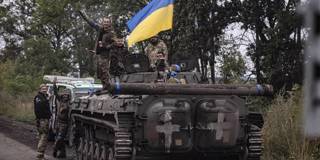OnPoint Subscriber Exclusive
The Big Picture brings together a range of PS commentaries to give readers a comprehensive understanding of topics in the news – and the deeper issues driving the news. The Big Question features concise contributor analysis and predictions on timely topics.

Will Ukraine Win?
In the last two weeks, Ukrainian forces have retaken thousands of square miles of territory in the northeast and south in a powerful counteroffensive that sent Russian troops into a frenzied retreat. President Volodymyr Zelensky, who already paid a visit to the newly liberated city of Izium, is clearly hoping to capitalize on these successes to lift Ukrainian spirits, bolster international support, and ensure that Ukraine continues regain its territory. After more than six months of fighting, has the war reached a turning point?
MIT’s Simon Johnson saw Ukraine’s success coming, noting even before the latest battlefield victories that, despite the Russian authorities’ “arrogant” tone, the war had “turned south for the Kremlin” on both the military and economic fronts. According to High Representative of the European Union for Foreign Affairs and Security Policy Josep Borrell, this will not change any time soon. On the contrary, as long as the West maintains its current sanctions strategy, the Kremlin will find it “virtually impossible” to turn the tide in Ukraine.
But Richard Haass of the Council on Foreign Relations warns that Ukraine’s leaders must not get ahead of themselves. Rather than become overly ambitious – say, by vowing to recapture Crimea – they should use the coming winter lull in the fighting to weigh their war goals against the economic costs of trying to achieve them. Slavoj Žižek of the University of London issues his own warning to Ukraine: by aligning itself with Israel – an occupier and oppressor – the country might be “compromising its own fully justified struggle for freedom,” which has much more in common with the plight of the Palestinians.
In fact, nobody has a greater interest in rebranding aggression as liberation than Russia. As Georgia Tech’s Dina Khapaeva points out, Russian President Vladimir Putin has long attempted to justify his “neo-imperial wars of aggression” by claiming he is defending Russia from enemies intent on destroying it. According to the Carnegie Moscow Center’s Andrei Kolesnikov and the Levada Center’s Denis Volkov, most Russians seem to believe him, though popular support for the Ukraine war might not be as robust as headline figures suggest.